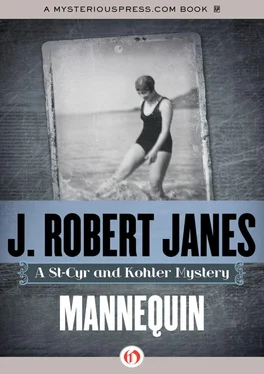J. Janes - Mannequin
Здесь есть возможность читать онлайн «J. Janes - Mannequin» весь текст электронной книги совершенно бесплатно (целиком полную версию без сокращений). В некоторых случаях можно слушать аудио, скачать через торрент в формате fb2 и присутствует краткое содержание. Год выпуска: 0101, Издательство: MysteriousPress.com/Open Road, Жанр: Полицейский детектив, Исторический детектив, на английском языке. Описание произведения, (предисловие) а так же отзывы посетителей доступны на портале библиотеки ЛибКат.
- Название:Mannequin
- Автор:
- Издательство:MysteriousPress.com/Open Road
- Жанр:
- Год:0101
- ISBN:нет данных
- Рейтинг книги:3 / 5. Голосов: 1
-
Избранное:Добавить в избранное
- Отзывы:
-
Ваша оценка:
- 60
- 1
- 2
- 3
- 4
- 5
Mannequin: краткое содержание, описание и аннотация
Предлагаем к чтению аннотацию, описание, краткое содержание или предисловие (зависит от того, что написал сам автор книги «Mannequin»). Если вы не нашли необходимую информацию о книге — напишите в комментариях, мы постараемся отыскать её.
Mannequin — читать онлайн бесплатно полную книгу (весь текст) целиком
Ниже представлен текст книги, разбитый по страницам. Система сохранения места последней прочитанной страницы, позволяет с удобством читать онлайн бесплатно книгу «Mannequin», без необходимости каждый раз заново искать на чём Вы остановились. Поставьте закладку, и сможете в любой момент перейти на страницу, на которой закончили чтение.
Интервал:
Закладка:
A mannequin … Starded, the detective threw him a look of savage puzzlement. ‘She was what? ’ he demanded.
Unsettled, Meunier thought to shrug the matter off. ‘Oh, she was from before that other war, Inspector. Very beautiful, very elegant. Tall and slender, with long chestnut hair and large dark brown eyes … Monsieur Verges’s son was very much in love with her. I used to see them strolling in the garden from time to time. It was the young Monsieur Gaetan who, at his father’s wish, asked us to do the announcement.’
A drooler … a girl with long chestnut hair and deep brown eyes … ‘May I keep this for a little?’ asked St-Cyr of the gilded announcement. ‘Please, I’ll take good care of it.’
‘Certainly. I have two others. We always keep three or four and always I seem to be thinking I ought to throw them out but can never bring myself to do so.’
‘Bon. Now, please, m’sieur, a word with your son for I greatly fear you have tried to mislead me and that he’s the one who really let the girl into the shop and spoke with her.’
Crestfallen that the information he had sacrificed had not accomplished what he had intended, the engraver sadly nodded in defeat. ‘He’s a good boy. Lonely-aren’t all such boys lonely when everyone says he should have done his duty and he can’t find the will to forgive a father’s love? He’s the only son I have, Inspector. No one else can carry on the name.’
‘Then let me speak to him. It will do no harm and go no further than the three of us.’
Reluctantly Meunier opened the door to the workshop. The boy had removed his glasses and apron and, though brushing tears from sensitive eyes, stood proudly waiting to be carted off to prison.
Ah maudit, what have we now? wondered St-Cyr, not liking it at all.
Dumbfounded, the father stood in silence gazing at his son as if for the first time.
The boy whispered, ‘Papa, forgive me.’
‘For what? For talking to that girl? ’
St-Cyr nudged the father out of the workshop and closed the door. He thought to say to the boy, You fool, he thought to say so many things but a sad weariness had overcome him and all he said was, ‘I’m Chief Inspector Jean-Louis St-Cyr of the Surete. My partner is from the Gestapo.’
‘The Gestapo …?’
The boy blanched. For perhaps ten seconds the pale grey eyes in that thin, angular face met his as the ghastly reality of those two words sank in.
Paul Meunier was delicate, thin and tall. A boy, a young man-one always spoke of both in the same breath-of about twenty-six years of age.
‘My family,’ he blurted. ‘My father, my mother and my sister …’
‘They will all be shot, as will yourself,’ said St-Cyr, not sparing him but hating himself for having to adopt the guise of the Occupier, ‘unless, of course, we can come to some agreement.’
‘Agreement?’ It was a yelp. The boy wet his pale lips and, at a loss as to what to do with his right hand, pushed back the silky light brown hair that had fallen over his brow.
‘Look, my interest is in the missing girl, Joanne Labelle.’
‘Not in the papers?’
‘Don’t be an idiot! Don’t offer information like that!’ Merde alors, must God do this to him, a simple detective? ‘Listen, mon ami, one can read your mind so clearly! Forging papers. Making a hero out of yourself so that the girls will think more highly of you. Hey, do you know something, my fine martyr? I don’t want to know who you forged them for.’
He doesn’t want to know …? ‘My father, he … he forbade me to go into the army.’
An impatient hand was tossed. ‘Forgive him. That’s the only thing you can do. Now listen, I want you to shut up about these forgeries. Sure I know the Resistance must be using you, but I have to walk the knife edge always, so the less said the better.’
Was the inspector involved in something himself? wondered Meunier. Was it best to let him go on thinking that it was the Resistance he had done the forgeries for and not Mademoiselle Marie-Claire de Brisson, the banker’s daughter? The nights and nights of patient practice and experimentation until she was satisfied and it was done. Three sets of documents with laissez-passers for Provins and Dijon. The travel papers had been the hardest to forge, the others not so bad, and in time, perhaps, the Resistance would be able to use him once a suitable contact was made.
‘Your partner …’ began the boy.
St-Cyr told himself the Resistance should never have used this one, that the boy would drag them all down, himself as well if mentioned. ‘My partner, yes. Hermann Kohler of the Gestapo.’
‘Will you … will you be telling him that I …’
‘That you are a forger for the Resistance? Perhaps I will, perhaps I won’t. I leave you to worry about it, eh? So watch yourself and don’t try to leave the city. Now tell me about Joanne Labelle. Tell me everything. Try to forget about my partner.’
Kohler let a breath escape slowly as he compared the head-and-shoulders photo in one of the card-index drums of missing persons with a photo from the house, then moved on to the dossier Emile Turcotte had pulled for him.
On Thursday, 3 July 1941, a girl named Renee Marteau had answered an advertisement in Paris-Soir. She had been an out-of-work mannequin with nearly two years’ experience and had, apparently, seized on the advertisement as a means of getting herself back onto the circuit.
Long chestnut hair and deep brown eyes all right. A bit small in the bust, but what the hell, that wasn’t everything when you had smashing legs, a nice smile and a gorgeous posterior.
He turned a page and found the first of six grainy black-and-white police prints that made him turn away and nearly lose his lunch, though that had been eaten hours ago.
On 15 August 1941 her nude and badly battered body had been found washed up downriver in St-Cloud just past the Citroen works. It had caught against the mooring cable of a refuse barge that had been machine-gunned during the blitzkrieg and had sat on the bottom ever since. Weeds were in her mouth and nostrils. Mud was smeared in streaks over pale white skin that looked cold.
She hadn’t been in the water long. Perhaps twenty-four hours at the most. A vagrant had found her. Hair all chopped off so that only tufts remained. Throat cut. ‘A slice from the right and savagely,’ hissed Turcotte who had never been at the discovery of this corpse or any other, and not even at the morgue. ‘The breasts removed for good measure but we feel this was done before the killing.’
Verdammt! swore Kohler. What the hell was he to tell Louis?
Records occupied the whole of the sixth and top floor of what had formerly been the Head Offices of the Surete Nationale but was now that of the Gestapo in France. Screams in the cellars, dread on the rue des Saussaies and the rue du Faubourg Saint-Honore right in the very heart of the city, only whispers and dark looks up here where seventy or so French detective-clerks in grey smocks foraged round the clock in shifts for news or filed away another bit.
The Surete had never thrown a thing out. Second only to the records of the Gestapo in Berlin, the whole damned place had been taken over lock, stock and barrel in June 1940. A treasure trove of criminals and their crimes to which, as a measure of Germanic efficiency and consolidation, had been added the files of the Prefecture of Paris. Talbotte had seen fit to keep copies for himself but had been reluctant to object. He had known his place and still did only too well.
In addition to the ten or fifteen million dossiers and cards dealing with outright crime, there were the millions of other bits and pieces that might eventually prove useful. One never knew. Apply for a passport or a visa in pre-war days, or even now, or a new set of papers, and you got a card here. Apply for a hunting licence in days past when such a thing was possible, and you got a special card, complete with registration number. Nice for the Occupier. No problem in finding stray rifles and shotguns that should have been turned in. Apply for a marriage licence, birth certificate or divorce-yes, here divorce had been legal before the war, though now Petain and the government in Vichy frowned on it, the hypocrites. Age, date of birth, sex, race, colour of eyes, nose, height, weight, religion, address and those of the closest relatives, place of residence, job, education … it was all here, locked up in silence until the wheel was spun, a drawer opened or the pen taken up.
Читать дальшеИнтервал:
Закладка:
Похожие книги на «Mannequin»
Представляем Вашему вниманию похожие книги на «Mannequin» списком для выбора. Мы отобрали схожую по названию и смыслу литературу в надежде предоставить читателям больше вариантов отыскать новые, интересные, ещё непрочитанные произведения.
Обсуждение, отзывы о книге «Mannequin» и просто собственные мнения читателей. Оставьте ваши комментарии, напишите, что Вы думаете о произведении, его смысле или главных героях. Укажите что конкретно понравилось, а что нет, и почему Вы так считаете.












